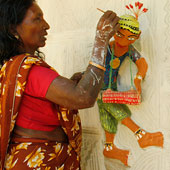Interview is a method by which a researcher gathers information and gains an understanding about the participants by asking questions. Interviews can be unstructured (are not directed by a script, rich but not replicable), structured (are tightly scripted, often like a questionnaire) and semi-structured (guided by a script but interesting issues can be explored in more depth. As a method they can provide a good balance between richness and replicability) and unstructured or conversational. Structured interviews are best used when detailed information is sought on a particular topic or when specific questions or doubts have arisen during observation and you need clarification. This method works well when you want to ask the same set of questions to many people. Semi-structured interviews are useful, when you have an intention on finding out certain things but you want to offer the interviewee some space to add something that you haven’t been familiar with or aware of. The unstructured or conversational form of interview is best in the preliminary stage of research when you are trying to get a broader picture of a person, an activity or an event. You always benefit from talking to the same person multiple times, but that opportunity may not always be available. And sometimes after you have the same conversation many times, the participants may start second guessing you and telling you what they think you want to hear. The choice of an interviewing method depends upon factors such as the nature of inquiry, the amount of time the interviewee is able to give, and the opportunity to be able to interview the same person more than once. At times it helps to repeat the same set of questions with several individuals when you are trying to understand a particular phenomenon, activity or an event.
Benefits of interviewing: Interviewing as a method makes you more efficient as a researcher by allowing you to prepare a list of questions or an interview guide in advance. This guide can improve gradually through iterations.
How to conduct an interview?
Typically an interview begins with an introduction of yourself and explaining goals of your study. Be pleasant and dress in an acceptable and appropriate manner for the interview. You can reassure the interviewees about ethical issues and seek their permission to record information. You can present a formal consent form to the participants at the end of the introduction. If you are part of an institution, this step is critical. At times, as a part of seeking the consent you may be required to communicate the research questions in advance to the interviewees.
Begin with a warm-up session that includes easy and non-threatening questions that will put participants at ease. Once everyone feels comfortable, you may present main questions in a logical order. You may ask questions in between but it is best not to interrupt the interviewee mid-response. If the interviewee’s responses meander a bit, that is okay give them the time to think or recollect information- do not be in a rush to complete your list of questions. Each individual is different and levels of articulation may vary, therefore you may help participants by prompting but do not put words in their mouth. To conclude introduce a cool-off period towards the end where you include a few easy questions to diffuse tension, that may have built up in course of the conversation. Be sure to thank the interviewee to signal the end. Don’t forget to get their contact details in case you intend to contact them again or send them pictures, articles etc. Offering to share pictures or recordings from the interview, signals politeness. Ask them if you could interview others in their circle who could add value to your study in any way.
Interviewing guidelines:
• Ask participants to complete a consent form
• Check recording equipment in advance, ensure you have spare batteries etc
• Devise a system for coding names of participants to preserve confidentiality
• Use probes (devices for getting more information) e.g. would you like to add anything?
• Use prompts (devices to help interviewee) e.g. help with remembering a name
• Too much probing and prompting can encourage participants to try to guess the answer
• Be aware of your own biases and privacy of concerned participants.
Things to Avoid When Preparing Interview Questions:
You should avoid long sentences while preparing questions for the interview. Compound sentences cause confusion and can be split into two. Jargon & language that the interviewee may not understand may be avoided Leading questions such as 'Why do you like …' that make assumptions must be avoided. You ought to be careful of unconscious biases.
For example, gender stereotypes creep in during the interview.
You may find yourself recording and interpreting data at the same time. Having an organized note-taking system would help keep things in order, as far as data and your reflections about it are concerned. Let us begin with understanding the method of writing field notes.

Interviewing as a method makes you more efficient as a researcher by allowing you to prepare a list of questions or an interview guide in advance.
More information about interviewing can be found at:
www.qualres.org/HomeInte-3595.html

